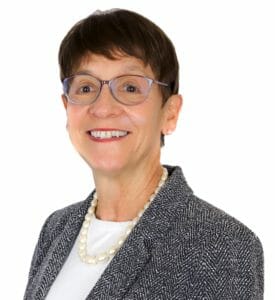Editor’s note: After nearly two years operating during a public health emergency, skilled nursing leaders are looking to put COVID-19 challenges behind them as soon as possible, and reinvigorate their workers, facilities and the industry. McKnight’s Long-Term Care News is asking executives: What will it take to rise above current obstacles and soar “Onward and Upward?”
Investments in innovation and a willingness to forge new partnerships will help lift skilled nursing providers out of the COVID-era, predicts Donna Kelsey, a veteran nursing home leader who knows quite a bit about righting a ship.

As CEO of American Senior Communities, Kelsey guided 78 Indiana long-term care facilities through the darkest days of the pandemic. The year 2021 presented an almost “complete turnaround,” she said, but staffing woes that have plagued nursing homes nationwide brought deep pain to ASC, among others.
“At any one time, out of our buildings, we have about 5% that simply can’t take residents because of the staffing issues,” Kelsey said during a late December interview. At that time, ASC had 10 buildings restricting all admissions, and others had closed entire wings because of about 1,000 open positions companywide.
“That’s what’s hurting us,” she said. “That reflects in our census. From the beginning of the year, we’re up 5%. But we turned away around 400 greenlighted referrals in the last three months because of staffing. That can’t go on. You can’t stay in business if you can’t take the patients.”
That can’t go on. You can’t stay in business if you can’t take the patients.
Donna kelsey
Making infection control No. 1
Working with her board and the county entity that owns most of ASC’s facilities, Kelsey is spearheading efforts both to make her buildings cleaner and safer, and to clean up a nursing home reputation she said has been unfairly tainted by media coverage of the COVID crisis.
ASC’s main lease-holder, the Health and Hospital Corporation of Marion County, made significant investments in infection control measures. They range from needlepoint bipolar ionization (funded in part by Provider Relief funds) to HEPA filters and fine-mist aerosol bleach sprayers. They have added nearly 90 infection preventionists to the payroll, including at least one for each skilled nursing location, and a home office director to add expertise and support communities.
And there are now far more private rooms in ASC buildings. That’s partly thanks to staffing problems, but individual rooms will play a larger role in the company’s future too.

“Infection control is second to none now. We have to get people comfortable to get back in the buildings, to know that they will not be infected,” Kelsey said. “Going forward, it’s going to be difficult. I’m an optimistic realist. The realist in me says the (federal relief) money is not coming anymore. We have to make do with what we have. We are looking at each of our buildings individually, looking at private rooms (and how we can) bring someone in to ensure they don’t have COVID or any other disease. If they do, how can we easily isolate them?”
If staffing rebounds, pressure would naturally resume to hit previous census marks. In that case, Kelsey said she may reopen some shared rooms as a means to an end. Increased revenues would fund remodeling and additions at some ASC buildings.
“You have to calculate the costs: You can’t borrow money and not pay it back,” said Kelsey, a former U.S. Navy captain and Naval Reserve officer who spent nearly two decades with Kindred Healthcare.. “I have the commitment, though, of the company to go ahead and renovate certain buildings that have good bone structure, if you will, to make them viable for single rooms. We are definitely looking at the future to do that.”
Partnering to improve leverage
Indiana has fairly high Medicaid reimbursements rates compared to many other states. But it’s also overbedded, Kelsey said, which makes for stiff competition when it comes to attracting both workers and patients.
Partnerships have become even more critical for recruiting workers and providing the best clinical care.
“There are all kinds of relationships that we need to get going,” said Kelsey. “Our hospitals are not what they were two years ago. They’re still into the COVID fight. Their short-term hips and knees and all that good stuff have once again been put on hold.”
Coordinating and keeping track of the demands from various payer sources is a constant challenge, with managed care companies sometimes requiring changes “on a minute’s notice.”
ASC is currently partnering with other Indiana skilled nursing operators in an attempt to create a provider network to contract with the managed care entities as a larger group and improve negotiating power. Indiana’s managed care Medicaid program pays capitation rates for skilled nursing, leaving much of the power with the five major companies operating the plans.
“That’s one of the things we’re working on in Indiana here, legally. How do we come together as a group of providers to have your voice heard?” Kelsey said.
At the same time, ASC is partnering with physician groups that bear risk for certain patient groups, which brings additional clinical staff into the buildings.
“We have an opportunity here,” she said “Our doc groups follow their patients because they have taken risk on that patient. The last place they want them is a hospital, and the second to last place is a nursing center. They’re very invested in ensuring the resident gets good care and then returns home as soon as possible.”
Kelsey thinks having that extra clinical proficiency is something her company can build a reputation on in a staff-starved market.
“Our sales force and business development, (they) go out and find these partners because they’re popping up all the time,” Kelsey said. “If I looked at who I was partnering with just two years ago, that’s changed.”
More aggressive recruitment
ASC also has added two staff members whose jobs are to recruit from hospitals, high schools and colleges, and other, non-traditional sources such as disability rights advocates or volunteers who might be looking for work.
The talent isn’t coming to us. We have to go out and find them.
donna kelsey
“The talent isn’t coming to us,” Kelsey said. “We have to go out and find them.”
In addition, Kelsey is eager to reinstate a volunteer program that brought students to her communities to spark interest in long-term care careers — even if that’s in dining services. ASC recently became a certified culinary apprentice site so that would-be chefs can get exposure to working with seniors. It’s an important step; she reports hiring dietary and housekeeping is now “as challenging” as hiring CNAs.
Last year, the company swapped “hefty” sign-on bonuses that failed to attract in large numbers for a comprehensive review of its rewards and compensation packages.
“We looked at all our pay bands and we’ve done big wage packages in many of our centers,” said Kelsey, noting that higher base pay has become more important than potential shift differentials. “A lot of people ask ‘What am I guaranteed to get? If I can pick up $20 at the famous Amazon, why would I work for you for less?’”
ASC is now paying CNAs more than $15 an hour. The company also has improved career ladder opportunities for personal care aides. They can move to certified nurse positions, then onto medication assistants and eventually into licensed nursing roles.
But Kelsey is playing for long-term care’s long-term future with support for a “robust” administrator-in-training program.
“When we talk about culture and we talk about retention, it all comes down to culture in the building,” said Kelsey. “I, as the CEO, like to think I can have an ability to change culture everywhere, but it really comes down to your supervisor and your leader in the building. Leadership development for our leaders and executive directors as well as our department heads hopefully will make a difference.”
Rebuilding trust
It was in 2016 that Kelsey came to ASC, after an embezzlement scandal led to the conviction of the previous CEO and the flight of other top leaders. Rebuilding in the financially and psychologically damaging aftermath may have strengthened ASC before COVID hit.
“When I first got here, it was really hard for the people who were left behind,” she said. “They were very saddened that their trust was betrayed. But the word ‘resilience’ comes to mind when I think about then and I think about now.”
Some of the moves she made pre-COVID paid off in enabling better communication. As a new CEO, she tried to remove divisions that siloed buildings or functions. During COVID, daily phone calls and meetings and the deployment of corporate staff to facilities in crisis helped build confidence amid mid-level managers and direct care staff.
“That made us stronger, learning how to communicate and support each other,” the CEO explained.




